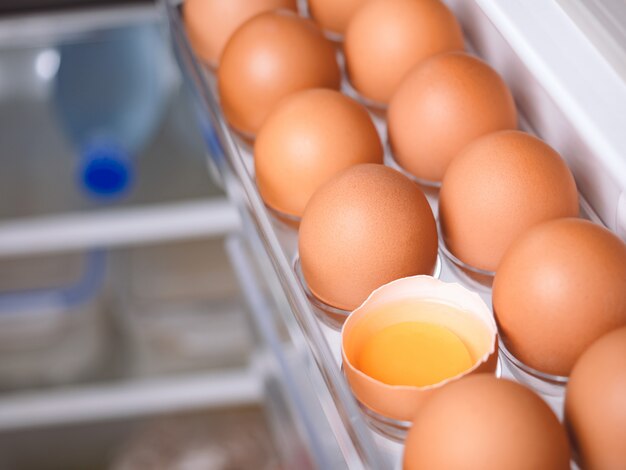Freshness Uncovered: How Long Can You Keep Eggs in Your Refrigerator?
Imagine you're standing in your kitchen, reaching for eggs to whip up a delicious breakfast only to pause—a lingering question surfaces: how long do these eggs really last in the fridge? Understanding the shelf life of eggs isn't just a matter of convenience; it's a crucial step in ensuring food safety and minimizing waste in your home. Let's crack open this topic and delve deep into the lifespan of eggs in refrigerator storage, while also exploring the best practices for keeping them fresh.
🥚 Understanding Egg Shelf Life
Eggs are one of the staples found in households worldwide. They are versatile, nutritious, and relatively long-lasting. However, the shelf life of eggs can vary depending on several factors, making it essential to store them properly to maximize freshness.
How Long Do Eggs Last in the Fridge?
Refrigerated eggs typically last between three to five weeks. When stored properly, they can remain safe to consume even beyond their expiration date. However, the best indicator of an egg's freshness is often the "sell-by" or "expiration" date printed on the packaging. It’s wise to consume eggs within a couple of weeks past this date for optimal quality.
Factors Affecting Egg Longevity
- Temperature: Keeping eggs consistently at a cool temperature, ideally around 40°F (4°C), helps extend their longevity.
- Storage Method: Store eggs in their original carton on a refrigerator shelf, not the door, to prevent temperature fluctuations.
- Egg Condition: The cleanliness of eggs matters, too. Unwashed eggs have a natural protective coating known as the “bloom,” which can prolong shelf life.
The Julian Date on Egg Cartons
Ever noticed a set of numbers other than the expiration date on an egg carton? This is the Julian date, which indicates the packing date based on the calendar day of the year (e.g., January 1 is 001 and December 31 is 365). Understanding this can provide additional insights into exactly how fresh your eggs are.
🥄 Best Practices for Egg Storage
Keeping your eggs fresh doesn't stop at sticking them in the fridge. Here are some pro tips to ensure they stay fresh for as long as possible:
- Store Eggs in Their Carton: The carton offers protection against strong odors and flavors that can be absorbed by eggs, as well as potential damage or cracking.
- Keep Eggs in a Consistent Temperature Environment: Avoid placing eggs in the refrigerator door, where temperature fluctuations from opening and closing can accelerate spoilage.
- Check Before You Buy: Always inspect eggs at purchase for cracks or odd odors, which can shorten their usable life.
🛡️ Handy Tips for Handling Eggs
- Conduct a Freshness Test: Wondering if your eggs are fresh? Conduct a simple water test. Place an egg in a bowl of water—if it sinks and lays flat, it’s fresh. If it stands upright or floats, it's best not to use it.
- Crack and Examine: Before using eggs in a recipe, crack them open into a separate bowl. Look for odd colors or odors, an immediate indicator of spoilage.
- Plan Usage: Use the oldest eggs first to ensure none go to waste.
🔍 Recognizing Spoilage: Signs Your Eggs Have Turned
Despite best practices, there may be times when you'll encounter an egg past its prime. Here’s what to look for:
- Off-Putting Smell: A sulphuric or rotten odor is a clear indicator of spoilage.
- Unusual Appearance: Pinkish whites, greenish yolks, or any signs of mold indicate it's time to toss the egg.
- Altered Texture or Consistency: Sliminess or excessively watery whites are spoilage signs.
Taking note of these factors ensures that eggs remain a safe and enjoyable part of your diet.
🗒️ Quick Reference: Egg Storage Guide
Here's a quick overview of the key points to remember:
| Tip | Description |
|---|---|
| 🗓️ Check Dates | Use by the sell-by or expiration date, ideally within 3-5 weeks of purchase. |
| 📦 Store in Carton | Keeps eggs from absorbing odors; store on a shelf, not the door. |
| ❄️ Maintain Temperature | Keep eggs consistently at 40°F (4°C) in the fridge. |
| 🌊 Freshness Test | Use water immersion to test egg freshness before use. |
🥗 Beyond Breakfast: Creating Delish Dishes with Older Eggs
Don't rush to discard eggs approaching their expiration date. Older eggs are actually fantastic for certain applications:
- Hard-Boiling: Older eggs are easier to peel once boiled, making them perfect for deviled or salad eggs.
- Baking and Batters: Slightly older eggs can work well in cake and cookie recipes, providing the rise and texture needed.
🌟 Key Takeaways for Sustained Freshness
- Mind Your Cartons: Always store eggs in their carton, away from strong odors and temperature changes.
- Act on Dates: While expiration dates provide guidance, always check eggs using sensory cues.
- Use Your Resources: Eggs nearing their shelf life can still offer plenty of culinary versatility, minimizing waste.
Maintaining egg freshness is all about balanced storage and thoughtful usage. Armed with this knowledge, you can navigate the often-mystifying world of food storage with confidence, ensuring every egg that you bring home offers the best in flavor, nutrition, and safety.
Remember, a little attention to detail goes a long way in keeping your kitchen running smoothly and your breakfast options—egg-ceptional!

